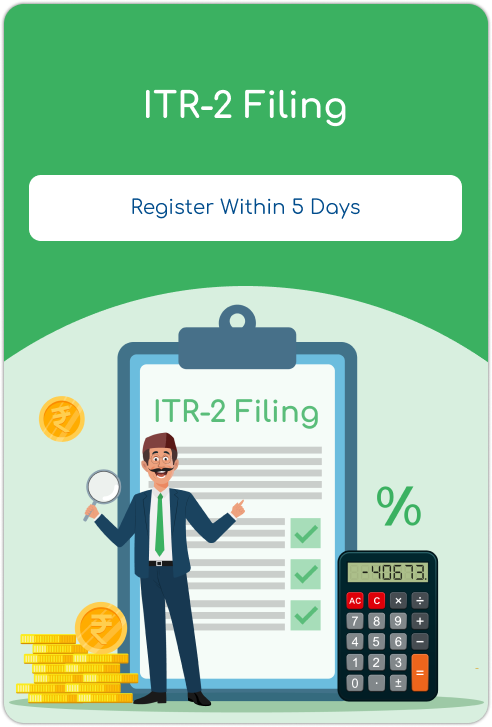
File Your ITR-2
4136 customers
What will you get?
Billing Application
Access of Android
Access of Web Application
Account Writing
Debtors, Creditors monitoring
Income Tax filling
GST Compliances
Financial Planning
Loan Advisory Services
What do we Require?
INR 0 Taxes As Applicable











Introduction
Income Tax Return Form 2, or ITR-2, stands as a cornerstone in the spectrum of income tax compliance in India, offering a robust platform for individuals and Hindu Undivided Families (HUFs) with intricate financial profiles. Unlike the simplified framework of ITR-1, ITR-2 accommodates a broader spectrum of income sources and investments, making it the go-to choice for taxpayers with complex financial affairs. From capital gains and foreign assets to income from business or profession, ITR-2 provides a comprehensive canvas for taxpayers to meticulously report their financial transactions, deductions, and tax liabilities. Its versatility and depth make it indispensable for individuals and HUFs navigating the intricacies of the Indian tax landscape. In this detailed introduction, we delve into the nuances and significance of ITR-2 filing, elucidating its role in ensuring compliance with the country's tax laws and fostering financial transparency. At ProMunim, we understand the complexities that individuals and Hindu Undivided Families (HUFs) encounter when navigating the intricate landscape of income tax compliance, especially with the diverse array of financial transactions and investments. That's why we are proud to introduce our specialized ITR-2 Filing Service, tailored to cater to the unique needs and challenges of taxpayers with more complex financial profiles. Our service offers a comprehensive solution for seamless and accurate filing of Income Tax Return Form 2 (ITR-2), ensuring that every detail, from capital gains and foreign assets to income from business or profession, is meticulously accounted for. Backed by our team of experienced tax professionals and advanced technology, ProMunim's ITR- 2 Filing Service provides peace of mind, knowing that your tax obligations are being handled with precision and efficiency. Let us simplify your tax filing experience, allowing you to focus on what matters most—your financial well-being and peace of mind.
Eligibility:
The eligibility criteria for filing Income Tax Return Form 2 (ITR-2) in India are primarily based on the complexity of the taxpayer's financial affairs. Generally, individuals and Hindu Undivided Families (HUFs) who meet any of the following conditions are eligible to file ITR-2:
- Multiple Income Sources:Taxpayers who have income from various sources such as salary, house property, capital gains, foreign assets, or income from business or profession.
- Capital Gains:Those who have earned income from the sale of capital assets like stocks, mutual funds, real estate, etc., and need to report capital gains or losses.
- Foreign Assets or Income:Taxpayers who hold foreign assets or earn income from outside India, including foreign bank accounts, foreign investments, or income from businesses or properties situated abroad.
- Income from Business or Profession:Individuals and HUFs engaged in business or profession, including freelancers, consultants, entrepreneurs, and self-employed professionals.
- Not Eligible for ITR-1:Taxpayers whose financial situation is too complex to be accommodated within the scope of ITR-1 (Sahaj), which is designed for individuals with straightforward income from salary, one house property, and other sources like interest income. It's essential for taxpayers to assess their financial situation and choose the appropriate ITR form accordingly to ensure accurate reporting and compliance with tax regulations. Consulting with a tax advisor or using online tools provided by the Income Tax Department can help determine the most suitable form for filing.
Documents Requirement:
- PAN Card:Permanent Account Number (PAN) card is essential for filing your tax return.
- Form 16/16A:If you're a salaried individual, you'll need Form 16 provided by your employer, which details your salary, allowances, deductions, and taxes deducted at source (TDS). Form 16A may be applicable for income from other sources like interest, dividends, etc.
- Bank Statements:Collect bank statements for all your savings and current accounts to report interest income accurately. This includes interest earned from fixed deposits, savings accounts, recurring deposits, etc.
- Section 80C (e.g., Provident Fund contributions, Life Insurance Premiums, Equity Linked Savings Schemes, etc.).
- Section 80D (Health Insurance Premiums).
- Section 80E (Interest on Education Loan).
- Section 80G (Donations made to eligible charitable institutions).
- Section 80TTA (Interest on Savings Account).
- Property Documents:If you own a house property, collect documents related to the property, such as purchase deed, sale deed, loan documents, rental agreement (if let-out), etc.
- Capital Gains Details:If you've earned capital gains from the sale of assets like stocks, mutual funds, real estate, etc., gather documents related to the transactions, such as sale/purchase invoices, contract notes, and capital gains statements from brokers.
- Foreign Income and Assets:If you have foreign income or assets, gather relevant documents such as bank statements, foreign account statements, foreign asset ownership documents, etc.
- Business or Profession Income:If you're engaged in business or profession, collect documents related to your income, expenses, profits, losses, and taxes paid, such as profit and loss statement, balance sheet, invoices, receipts, etc.
- Aadhaar Card:While not mandatory, having your Aadhaar card can simplify the filing process as it can be used for identity verification.
Due date for ITR 2 filing:
For Individuals (other than Companies) and HUFs (whose accounts are not required to be audited): the due date for filing ITR 2 is generally July 31st of the assessment year. For Individuals and HUFs (having income from business or profession) whose accounts are required to be audited: the due date for filing ITR 2 is typically September 30th of the assessment year. However, it's essential to check for any changes in the due dates announced by the Income Tax Department.
Late Filing ITR-2:
- If the return is filed after the due date but on or before December 31 of the assessment year, a late fee of up to Rs. 5,000 may apply.
- If the return is filed after December 31 of the assessment year, a late fee of up to Rs. 10,000 may apply.
- However, if the total income of the taxpayer does not exceed Rs. 5 lakhs, the maximum late filing fee is capped at Rs. 1,000.
- Interest on Delayed Payment of Taxes:In addition to the late filing fee, if the taxpayer has any tax dues pending, interest under Section 234A, 234B, and 234C may apply on the outstanding amount. This interest is calculated from the due date of filing the return to the actual date of filing.
- Loss of Certain Deductions and Benefits:Late filing of ITR-2 may result in the loss of certain deductions and benefits. For example, taxpayers may not be able to carry forward certain losses if the return is filed after the due date.
- Restrictions on Refunds:Late filing can also lead to delays in processing refunds, as the Income Tax Department prioritizes timely filed returns for processing.
Benefits of Deduction:
Filing Income Tax Return (ITR) using Form ITR-2 presents taxpayers with a multitude of benefits, chiefly among them being the opportunity to leverage deductions under various sections of the Income Tax Act. These deductions serve as powerful tools for reducing taxable income, thereby diminishing the overall tax liability. By claiming deductions available under sections like 80C, 80D, and 80E, taxpayers not only lower their tax burden but also gain avenues for strategic financial planning. Such deductions incentivize investments in vital areas such as provident funds, health insurance premiums, and education loans, fostering both financial security and prudent fiscal habits. Furthermore, deductions ensure compliance with tax regulations, enabling taxpayers to optimize their tax planning effectively while aligning with legal mandates. Ultimately, leveraging deductions while filing ITR- 2 empowers individuals and Hindu Undivided Families (HUFs) to navigate the tax landscape with confidence, driving financial stability and long-term prosperity.

